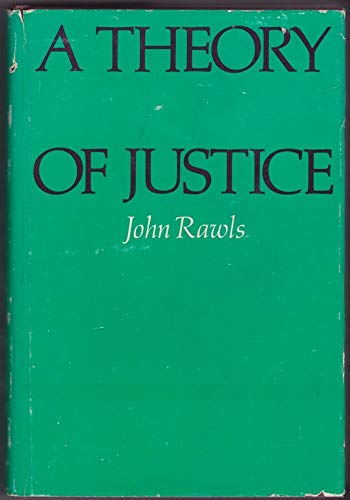Items related to A Theory of Justice

Synopsis
A work of moral and political philosophy of the twentieth century.
"synopsis" may belong to another edition of this title.
About the Author
John Rawls was James Bryant Conant University Professor at Harvard University. He was recipient of the 1999 National Humanities Medal.
Review
In his magisterial new work...John Rawls draws on the most subtle techniques of contemporary analytic philosophy to provide the social contract tradition with what is, from a philosophical point of view at least, the most formidable defense it has yet received...[and] makes available the powerful intellectual resources and the comprehensive approach that have so far eluded antiutilitarians. He also makes clear how wrong it was to claim, as so many were claiming only a few years back, that systematic moral and political philosophy are dead...Whatever else may be true it is surely true that we must develop a sterner and more fastidious sense of justice. In making his peerless contribution to political theory, John Rawls has made a unique contribution to this urgent task. No higher achievement is open to a scholar. (Marshall Cohen New York Times Book Review)
[Rawls] has elucidated a conception of justice which goes beyond anything to be found in Kant or Rousseau. It is a convincing refutation, if one is needed, of any lingering suspicions that the tradition of English-speaking political philosophy might be dead. Indeed, his book might plausibly be claimed to be the most notable contribution to that tradition to have been published since Sidgwick and Mill. (Times Literary Supplement)
Enlightenment comes in various forms, sometimes even by means of books. And it is a pleasure to recommend...an indigenous American philosophical masterpiece of the first order...I mean...to press my recommendation of [this book] to non-philosophers, especially those holding positions of responsibility in law and government. For the topic with which it deals is central to this country's purposes, and the misunderstanding of that topic is central to its difficulties...And the central idea is simple, elegant, plausible, and easily applied by anybody at any time as a measure of the justice of his own actions. (Peter Caws New Republic)
The most substantial and interesting contribution to moral philosophy since the war. (Stuart Hampshire New York Review of Books)
A rich, complicated, and fundamental work...Rawls possesses a deep sense of the multiple connections between social institutions and individual psychology. Without illusion he describes a pluralistic social order that will call forth the support of free men and evoke what is best in them. To have made such a vision precise, alive, and convincing is a memorable achievement. (Thomas Nagel Philosophical Review)
"About this title" may belong to another edition of this title.
US$ 5.75 shipping within U.S.A.
Destination, rates & speedsSearch results for A Theory of Justice
A Theory of Justice
Seller: Lexington Books Inc, Idaho Falls, ID, U.S.A.
hardcover. Condition: Good. First Edition. No dust jacket; ex-library; 1st edition, 5th printing 1973, maroon colored boards with been writing on spine. Seller Inventory # 153205
Quantity: 1 available
A Theory of Justice
Seller: Cat's Curiosities, Pahrump, NV, U.S.A.
Hardcover. Condition: Very Good. Dust Jacket Condition: Very Good. 1st Edition. A heavy octavo of almost 3 lbs., "very good" in a very-good jacket with a half-inch closed tear at top of front panel where it meets the spine. Bottom of jacket front panel has been price-clipped. Some scattered light brown speckling (foxing) to top and front page edges. The author was a Professor of Philosophy, Harvard University, and while not a declared socialist, was in fact a leveler, contending it's "unjust" for members of the working class to fare worse overall than those born into the "entrepreneurial" class, since it's the duty and proper role of society to distribute wealth and goods more or less equally. So, we're supposed to believe it was only because they were born into wealthy and privileged "entrepreneurial" families that wealth and influence (unjustly) crowned the labors of bobbin boy-turned telegraph messenger Andrew Carnegie; John D. Rockefeller (son of a con man who abandoned his family, a boy who started his business career at 16 as a bookkeeper's assistant at 50 cents a day); seventh-grade dropout turned gas station operator Harland Sanders; impoverished orphan Andrew Jackson; truck driver Elvis Presley, and apprentice meat cutter John Jacob Astor? One of the main reasons such success stories have become less common in America is the tax and regulatory burden imposed on savings and investment by the redistributionist, confiscatory schemes of "economic justice" promoted by the levelers allowed to shelter from the real economic consequences of such tyranny over the aspirations of the human soul at places like (the vastly endowed) Harvard University. 607 pp. including Index. (If you wish to order this book, it's really very simple: Click "Add to Basket" and then "Proceed to Checkout." Proceeding in any other manner -- especially contacting us with an email that begins with the disingenuous claim "I'm really interested in this book" and then proceeds to set conditions in defiance of our prominently posted Terms of Sale -- will considerably reduce your chances of a successful purchase.) Reduced from $795. Seller Inventory # 011463
Quantity: 1 available
A Theory of Justice
Seller: dsmbooks, Liverpool, United Kingdom
Hardcover. Condition: Good. Good. book. Seller Inventory # D7S9-1-M-0198243685-3
Quantity: 1 available
A Theory of Justice
Seller: Burnside Rare Books, ABAA, Portland, OR, U.S.A.
Hardcover. Condition: Near Fine. Dust Jacket Condition: Very Good. First British Edition. First British edition, first printing. xv, [1], 607 pp. Bound in publisher's navy cloth with gilt lettering. Near Fine with light reading wear, small black mark to bottom edges, in a Very Good dust jacket, light wear to laminate at edges, a few small tears and tape reinforcements to verso, unclipped. A nice copy of a modern classic of political philosophy. Seller Inventory # 140941926
Quantity: 1 available

